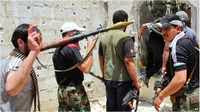British counter-terrorism police chiefs are making an unprecedented appeal to Muslim women to urge their relatives not to travel to Syria to fight.
The national campaign for women to intervene follows a string of deaths of UK men who joined Syria's civil war against President Assad's regime.
Co-ordinated events will be held in London, Birmingham and Manchester.
Critics and campaigners questioned whether the police were trusted enough to get their message across.
Security chiefs think hundreds of people have travelled from the UK to fight in Syria, some of whom have returned.
Forty people have been arrested over links to Syria this year, police said.
And reports suggest up to 20 men from Britain have died in the conflict.
Recent deaths have included Crawley father-of-three Abdul Waheed Majeed - who became the first British suicide bomber in the war - and a teenager from Brighton.
In February, Crawley father-of-three Abdul Waheed Majeed became the first British suicide bomber in the Syrian conflict
The number of UK arrests for alleged Syria-related offences during the first three months of the year is almost double those held during the whole of 2013.
On Thursday, the events in London, Manchester and Birmingham will bring together counter-terrorism police, officials who work on preventing extremism and women from community groups in an effort to urge people to stop others travelling to Syria.
The new strategy will see leaflets handed out at ports which spell out the potentially fatal consequences of going to the war-torn country.
Deputy Assistant Commissioner Helen Ball, national coordinator for counter-terrorism at the Metropolitan Police, said she wanted to start a national conversation with women to help protect young people from going to Syria.
She said police were "increasingly concerned" about the numbers of people intending to join the conflict.
"We want to ensure that people, particularly women, who are concerned about their loved ones are given enough information about what they can do to prevent this from happening," she said.
"We want to increase their confidence in the police and partners to encourage them to come forward so that we can intervene and help.
"This is not about criminalising people it is about preventing tragedies. We want to inform those who wish to genuinely help the Syrian cause how they can do so safely and legally."
She told BBC Radio 4's Today programme call handlers on the police non-emergency 101 number had been briefed about how to handle Syria-related calls.
People raising concerns could then be referred to "engagement officers" from the Prevent anti-terrorism project, who would meet them and offer help and support, she said.
They may then be contacted by a police officer, someone from another agency or from within the community, she added.
BBC home affairs correspondent Dominic Casciani said the campaign was an unusual move by counter-terrorism and security chiefs, representing a "tacit admission" that the government's message was not getting through.
The police would be facing a challenge of confidence as they attempted to get their message heard, he added.
Shiraz Maher, of the International Centre for the Study of Radicalisation, told the BBC the police were "the wrong people to be launching this type of campaign".
"That message should be coming out either from community groups or other elements of government," he said.
Mr Maher said using the police to lead the drive gave the impression it would end up "criminalising people".
He added the Home Office was responsible for fostering a lack of trust in communities after its "very aggressive approach" to the issue of Britons travelling to Syria.
Mussurut Zia, from the Muslim Women's Network UK, also said there was a "real mistrust" of the police in some communities.
She told the BBC it should be clear from the outset what support would be available to women and what they were expected to do.
'Desperate need'
Earlier this year, ministers and prosecutors warned that any involvement in fighting in Syria could breach terrorism laws and lead to a person's arrest back home. At least five terrorism-related prosecutions are currently awaiting trial.
The government has also urged Muslim communities to stop sending charity convoys to the region, asking them to work with major aid organisations with experience of war zones.
The Charity Commission is investigating at least two organisations amid fears that aid convoys have been used to funnel fighters and resources to jihadist rebels.
Labour MP Keith Vaz, chairman of the Commons Home Affairs Committee, said people might not be aware that their relatives were planning to join the fighting in Syria.
Families might also be reluctant to come forward, he said, questioning the role of the Met Police in the campaign.
"The Met is not not a counselling service, they are the first stage in the criminal enforcement process", he added.
From BEN Latest News: www.benlatestnews.com
Follow us on Twitter: www.twitter.com/benlatestnews















0 comments:
Post a Comment